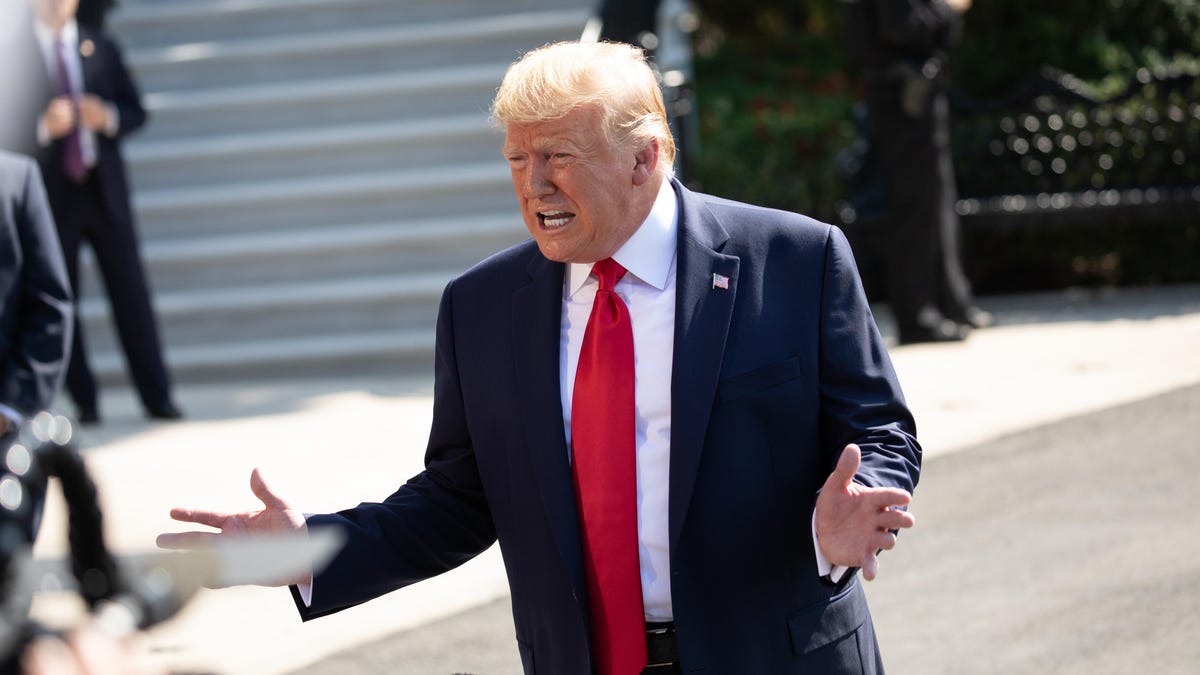Google denies Trump's accusations of voter manipulation
"Google should be sued," the president tweeted Monday morning.

President Trump says Google "manipulated" voters. Google disagrees.
Google denied accusations made on Monday by President Donald Trump that the search giant "manipulated" millions of voters against him in the 2016 election. Google said Trump seemed to be referring to an old report claiming to prove that it generated at least 2.6 million votes for Democrat candidate Hillary Clinton, but said the report has been "debunked since it was made."
"We have never re-ranked or altered search results to manipulate political sentiment," a Google spokesperson said in an emailed statement Monday. "Our goal is to always provide people with access to high-quality, relevant information for their queries, without regard to political viewpoint."
Citing what he claimed was a "report just out," Trump had tweeted earlier Monday that "Google manipulated from 2.6 million to 16 million votes for Hillary Clinton in 2016 Election."
"Google should be sued. My victory was even bigger than thought!" he added.
Wow, Report Just Out! Google manipulated from 2.6 million to 16 million votes for Hillary Clinton in 2016 Election! This was put out by a Clinton supporter, not a Trump Supporter! Google should be sued. My victory was even bigger than thought! @JudicialWatch
— Donald J. Trump (@realDonaldTrump) August 19, 2019
The original report (PDF) was published in June 2017 by Robert Epstein for the American Institute for Behavioral Research and Technology. Epstein reiterated in testimony before the Senate Judiciary Subcommittee on the Constitution in June 2019 that he believed Google's search algorithm produced "biased search results" that "likely impacted undecided voters in a way that gave at least 2.6 million votes to Hillary Clinton."
Answering questions from Senator Ted Cruz in a video posted in July by right-wing news publication Breitbart News, Epstein added 2.6 million is "a rock-bottom minimum."
"The range is between 2.6 and 10.4 million votes depending on how aggressive they were in using the techniques that I've been studying, such as the search engine manipulation effect, the search suggestion effect, the answer bot effect, and a number of others," he said.
With 10.4 million being Epstein's maximum estimated number of votes manipulated, it's unclear where Trump's 16 million figure comes from.
Epstein also claimed that if Google, Twitter and Facebook support the same candidate in 2020, "there are 15 million votes on the line."
"In 2020, you can bet that all of these companies are going to go all out, and the methods that they're using are invisible, they're subliminal, they're more powerful than most any effects I've ever seen in the behavioral sciences," he said.
Clinton tweeted a response to Trump Monday afternoon, saying the study has been debunked and was only based on 21 undecided voters.
"For context, that's about half the number of people associated with your campaign who have been indicted," she posted on Twitter.
The debunked study you’re referring to was based on 21 undecided voters. For context that’s about half the number of people associated with your campaign who have been indicted. https://t.co/0zHnWvGjSv
— Hillary Clinton (@HillaryClinton) August 19, 2019
The report had relied on 95 people from across 24 states, 21 of whom identified as undecided, performing daily election-related searches using Google, Bing and Yahoo. According to the report, the study showed search results were "biased in Mrs. Clinton's favor."
Trump's accusations on Monday came two weeks after he warned Google he's watching it "very closely" ahead of the 2020 US election. On Aug. 6, Trump tweeted he met with Google CEO Sundar Pichai to ask questions about Google's role in the 2016 election, claiming without evidence that the search engine giant is trying to "illegally subvert" the upcoming election.
"All very illegal," Trump said in a now-deleted tweet. "We are watching Google very closely!"

